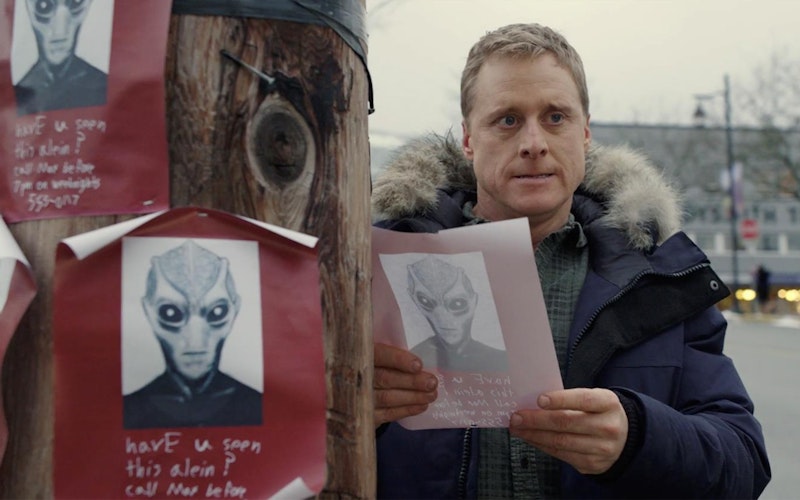
TV
Like Resident Alien, We are Not of This World
Dr. Harry Vanderspeigle (Alan Tudyk) seems like any other resident of Patience, Colo. The big-city surgeon, who had been spending his days relaxing at his lakeside cabin, has stepped in to become the tiny mountain town's new doctor upon the previous physician's unexpected death. With his knowledge of human anatomy and ability to deliver medicine, Harry appears to fit right in.
But some observers might notice some oddities. When Harry laughs, he does so with a crooked smile spread across his lips, as if he were wrenching laughter up from his gullet. When Harry looks at young children, they scream and run away in horror.
Harry behaves strangely because he’s not Harry. He’s an alien invader with an unpronounceable name, who has taken the real Dr. Vanderspeigle’s form after crash-landing on our planet and killing the human he now resembles. So goes the central premise of the Syfy dramedy series Resident Alien, which follows Tudyk’s faux-Harry as he tries to integrate himself in Patience, while also searching for lost ship parts and completing his mission: destroying the earth.
Despite his hostile objective, Harry finds himself entangled in the lives of the people he’s meant to annihilate. The premise gives lots of space for Tudyk to show off his comic chops. In the season’s fourth episode, Harry is invited to a family gathering by his coworker, Asta Twelvetrees (Sara Tomko). Finding himself touched by the genuine welcome her family extends to him, Harry tries to fit in. But these attempts begin with him revealing that a teenager in town (Kaylayla Raine) who works at the hospital and frequents the diner owned by patriarch Dan Twelvetrees (Gary Farmer) is the daughter Asta gave up for adoption as a teen. Shame drives Asta out of the room and her family processes the news with their jaws agape, all while Harry squeezes a chuckle from his mangled mouth, certain that he’s shared an emotional moment with his new friends.
Later in the episode, some of Asta’s family invite Harry to join their basketball game. Misunderstanding their praise of an initial lucky shot and their basic defensive strategy, Harry spends the game hugging opposing defensemen, slapping out of the air passes meant for him, and hurling the ball in every direction when he “shoots”—all with the same expression of oblivious pride. One of the teens calls Harry a ball hog, but no one identifies him for what he is. To the viewer, it’s incredibly clear that the creature masquerading as Dr. Harry Vanderspeigle is not of this world.
Harry behaves strangely because he’s not Harry.
To Christians, the phrase “not of this world” has meaning beyond extraterrestrial shenanigans. The phrase first appears in the Bible in John 17, which records Jesus’s prayer for his disciples before his arrest: “I have given them your word and the world has hated them, for they are not of the world any more than I am of the world.” His meaning becomes clearer in John’s next chapter, in which the Roman governor Pilate questions Jesus. Throughout the inquisition, Pilate asserts his power by pitting the Roman empire that he represents against the Jewish rulers whom he governs, suggesting that he can save Jesus from those who arrested him. But Jesus has no use for such mundane power plays. "My kingdom is not of this world," he tells Pilate. “If it were, my servants would fight to prevent my arrest by the Jewish leaders. But now my kingdom is from another place.” When Pilate takes the answer as a declaration of kingship, Jesus clarifies that “the reason I was born and came into the world is to testify to the truth. Everyone on the side of truth listens to me.”
Throughout the trial—indeed, throughout much of John’s gospel—Jesus draws a distinction between earthly powers and the kingdom he inaugurates. People like Pilate and the Jewish religious leaders think only in terms of power. They care most for the riches they can hoard and the control they can exert, thinking nothing of the lives they destroy in the process. But as he declared in his very first sermon, Jesus imagines a kingdom built by the weak, the poor, and the peacemakers. His ministry focused on the outsiders and the dejected. In the same way that he is the rejected stone who became the cornerstone, Jesus seeks outcasts and gives welcome to the strangers. Whoever the world does not want finds shelter in the kingdom of heaven.
With its over-the-top characters, Resident Alien offers a glimpse of this blessed kingdom of weirdos. So few people in Patience notice Harry’s odd behavior because all of them are just as strange. Aggressive Sheriff Thompson (Corey Reynolds) covers his constant police-work failings with self-serious bluster, just as Deputy Baker (Elizabeth Bowen) diminishes her sound and caring police work with meekness. Former Olympian D'Arcy (Alice Wetterlund) plays the part of a carefree party animal to distract from the sense of shame she feels for having to return to her hometown after her Olympic dreams fizzle. Harry inadvertently crash landed in a town filled with failures and oddballs, just like him.
That's a good thing for the show's humans. Because as Harry becomes more immersed in the lives of the people he was sent to kill, he finds himself less willing and able to complete his mission. Harry's opening voiceover narration initially justifies his plans by pointing to humanity's violent tendencies, but as he grows closer to the people of Patience, his narration highlights their care and hospitality.
Harry may be from another world, but he clearly sees ours. When Harry emulates the worst in humanity, he's following the world created by Rome and other empires. But when he sees humans loving and caring for one another, he sees a rarer world, the world God created and Christ calls us to build, no matter how weird we may be.
Topics: TV